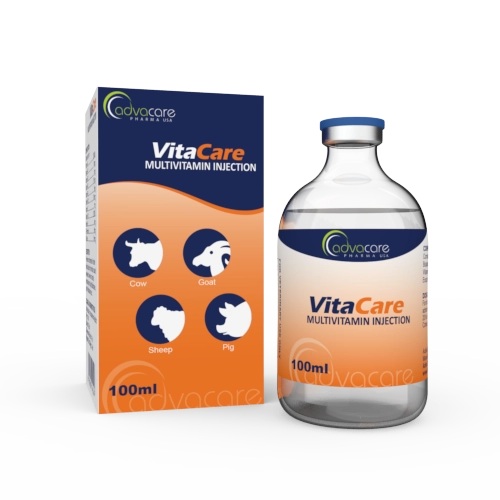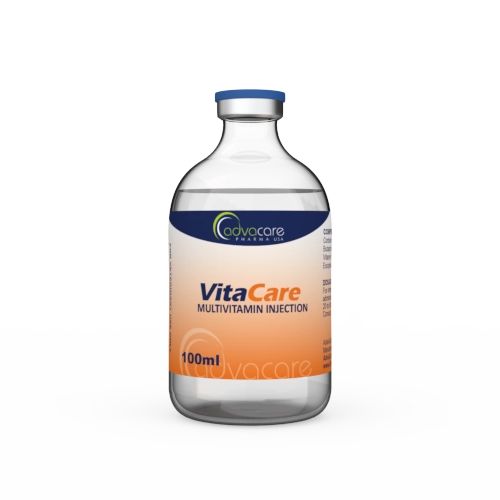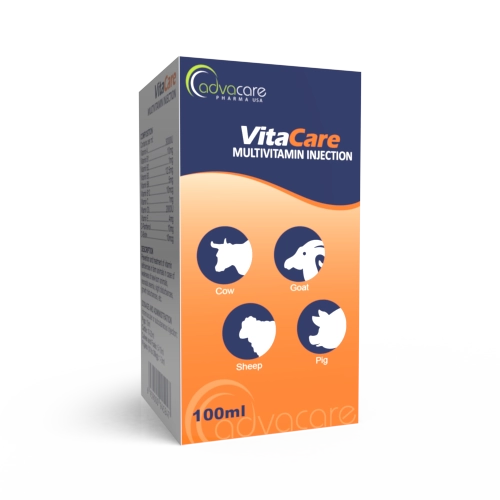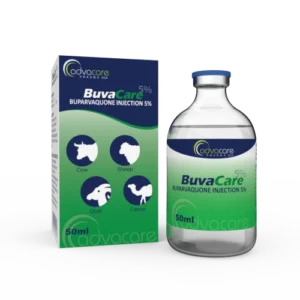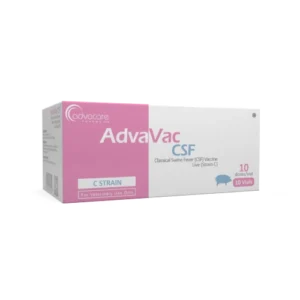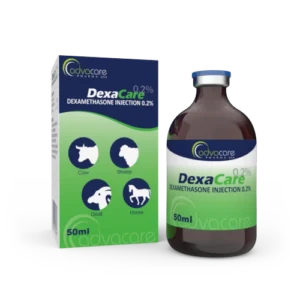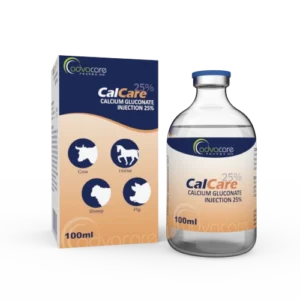What is a Multivitamin?
- Nutritional Supplement
- Camel,
- Cat,
- Dog,
- Cow,
- Goat,
- Horse,
- Pig,
- Poultry,
- Sheep
Active Ingredients: Vitamin A, Vitamin B1, Vitamin B2, Vitamin B3, Vitamin B6, Vitamin B12, Vitamin C, Vitamin D3, Vitamin E, D-Panthenol, D-Biotin
Multivitamin Injections are a supplement used to treat and prevent nutritional deficiencies in camels, cats, cows, dogs, goats, poultry, horses, sheep and pigs. It is used as a supportive therapy for young animals in the rapid growth phase. Nutritional deficiencies may lead to issues like avitaminosis, degenerative myelopathy, rickets, osteomalacia, tetany, keratitis, and convalescence.
This injection contains vitamin A, vitamin B1, vitamin B2, vitamin B3, vitamin B6, vitamin B12, vitamin C, vitamin D3, vitamin E, D-panthenol, and D-biotin.
Vitamin A plays a major role in maintaining healthy vision, skin, and immune function. Vitamin B1 (thiamine) is essential for carbohydrate metabolism and neural function, while vitamin B2 (riboflavin) is crucial for energy production and cellular function. Vitamin B3 (niacin) aids in digestive health and nerve function. Vitamin B6 (pyridoxine) is involved in amino acid metabolism, red blood cell production, and the synthesis of neurotransmitters. Vitamin B12 (cobalamin) is pivotal for neurological function and DNA synthesis.
Vitamin C is vital for collagen synthesis and immune function. Vitamin D3 is essential for calcium and phosphorus homeostasis, thus playing a key role in maintaining bone health. Vitamin E acts as a powerful antioxidant, protecting cellular components from oxidative stress. D-panthenol, a derivative of pantothenic acid (vitamin B5), aids in wound healing and energy metabolism. D-biotin is involved in fatty acid synthesis, amino acid metabolism, and the formation of glucose.
These collectively support various physiological functions and are particularly crucial during the rapid growth phases of young animals. Given the variation in dietary requirements among different species, the use of this multivitamin injection should be tailored to the specific needs of each animal, considering factors like age, health status, and specific nutritional needs.
Note that these Multivitamin Injections are for veterinary purposes only. Basil Hygiecare offers a selection of similar medications that are approved and available for human use; however, this particular formulation is intended to be prescribed by a veterinary doctor or animal care specialist for an animal.
Basil Hygiecare is a GMP-certified producer and exporter of Multivitamin Injections. This medication is manufactured in our facilities located in China, India, and the USA. We regularly inspect our production facilities to ensure our livestock medications meet quality and safety standards.
Why are we a trusted Multivitamin manufacturer?
Multivitamin Injection is manufactured and globally distributed by Basil Hygiecare, a leading manufacturer of veterinary injections in the pharmaceutical industry. We have been committed to distributing high-quality, GMP-certified veterinary medications for the global market over the past 20 years. As a top Multivitamin manufacturer, we ensure that all of our 100+ veterinary injections surpass our distributors’ requirements by conducting routine internal and third-party facility audits.
Precautions
Do NOT use Multivitamin Injection for an animal that has a known allergy or hypersensitivity to any of the ingredients.
Administration in animals with known allergies to any of its components can lead to severe hypersensitivity reactions, which may include symptoms like skin rashes, respiratory distress, and anaphylaxis, a potentially life-threatening condition.
In cases where an allergic reaction is suspected following the administration of the injection, immediate veterinary attention is required to manage the symptoms and prevent further complications.
What are the most common animals Multivitamin Injection is used for?
Multivitamin Injections are used across a variety of animal species, each with specific needs and applications:
- Camel: In camels, Multivitamin Injections are often used to support overall health, particularly in harsh environments where nutritional deficiencies might occur due to limited diet variety. They’re also beneficial during periods of stress, such as long treks or during racing seasons.
- Cat: For cats, injections are typically used to supplement diets that may be lacking in essential nutrients, especially in cases of illness, recovery from surgery, or in older cats with decreased dietary intake.
- Cow: In cows, they are crucial during periods of high stress, such as lactation and pregnancy. They support overall health, ensuring that the cows maintain adequate vitamin levels for both themselves and, in the case of pregnant cows, their developing calves.
- Dog: Dogs often receive Multivitamin Injections as a part of recovery therapy after illnesses or surgeries and for general health maintenance, especially in older dogs or those with chronic conditions that may affect their dietary intake.
- Goat: Goats are given these injections to prevent and treat vitamin deficiencies, which are common in fluctuating dietary conditions. This is especially important in pregnant or lactating goats and in young kids during their rapid growth phases.
- Horse: They are essential for horses in intensive training or those recovering from illness, aiding in muscle recovery and overall health maintenance.
- Sheep: In sheep, these injections are crucial during periods of rapid growth, pregnancy, and lactation. They help in preventing vitamin deficiencies that could lead to health issues, especially in grazing sheep with limited dietary variety.
- Pig: Pigs, including piglets, are given Multivitamin Injections to support overall health, growth, and development. They are particularly important for piglets in their early stages of growth and for sows during gestation and lactation periods.
- Poultry: For poultry, Multivitamin Injections are used to support immune function and overall health, especially during periods of stress, such as changes in environment or during peak egg-laying periods. They help in maintaining optimal growth and egg production.
Uses
What is a Multivitamin used for?
It’s used to treat or prevent nutritional deficiencies caused by many factors such as illness or convalescence.
What animals can be treated with Multivitamin Injections?
It is recommended for camels, cats, cows, poultry, dogs, goats, horses, sheep, and swine. It’s suitable for young animals in the rapid growth phase, such as calves.
How is a Multivitamin Injection used?
This medication has been manufactured as a liquid, which is packaged in a vial. It is intended to be administered by intramuscular or subcutaneous injection. Multivitamin Injection is intended for veterinary use only.
What is the withdrawal period for a Multivitamin Injection?
The withdrawal period is 28 days for meat.
Can Multivitamin Injection be administered alongside other medications or supplements?
It may interact with other medications or supplements the animal is receiving. Before administering the injection, inform the veterinarian about all medications and supplements the animal is currently taking. This includes over-the-counter products and herbal remedies.
What specific conditions or deficiencies are Multivitamin Injections most effective in treating?
Multivitamin Injections are effective in treating conditions caused by or associated with vitamin deficiencies, such as poor growth, weakened immune systems, and general convalescence after illness or surgery.
Is there any specific time of day that is best for administering Multivitamin Injections?
There isn’t. The timing can depend on the animal’s routine and the veterinarian’s recommendations.
How often should Multivitamin Injections be administered for optimal health?
It depends. Typically, a dose every 10-14 days is common, but specific schedules should be determined by a veterinarian.
Are Multivitamin Injections safe for all breeds and sizes of the animals listed?
Generally, they are safe for all breeds and sizes, but dosages may vary.
What should be done if an animal shows no improvement after receiving Multivitamin Injections?
If no improvement is observed, consult a veterinarian for further evaluation, as there may be underlying health issues that require different treatment.
What are the signs that an animal might need Multivitamin Injections?
Signs can include poor coat condition, lethargy, slow growth, weak immune response, and recovery from illness or surgery. A veterinarian can provide a definitive recommendation.
How should Multivitamin Injections be stored?
This medication should be stored in a dark, dry location under 30°C. The vial should be sealed tightly.
Dosage
How much Multivitamin Injection should be given to horses or cows?
The usual dose is 20-30ml, given IM/SC. Treatment can be repeated after 10-14 days, if necessary.
How much Multivitamin Injection should be given to calves, foals, and sheep?
The usual dose is 5-10ml, given IM/SC. Treatment can be repeated after 10-14 days, if necessary.
How much Multivitamin Injection should be given to pigs and goats?
The usual dose is 2-5ml, given IM/SC. For piglets up to 10kg, the usual dose is 0.5-2ml. Treatment can be repeated after 10-14 days, if necessary.
How much Multivitamin Injection should be given to cats and dogs?
The usual dose is 1ml.
What should be done if a scheduled dose of Multivitamin Injection is missed?
Administer the missed dose as soon as remembered, but if it is nearly time for the next dose, skip the missed one and resume the regular schedule. Do not double the dose to make up for the missed one.
What are the signs of an overdose, and what should be done if such is suspected?
Signs of an overdose can vary but may include symptoms like gastrointestinal upset, changes in urinary habits, lethargy, or allergic reactions. If an overdose is suspected, contact the veterinarian immediately. Overdose requires prompt veterinary attention to prevent serious health complications.
Refer to a veterinary doctor or pharmacist for guidelines on dosage.
Side Effects
As with all pharmaceuticals, some unwanted effects can occur from the use of Multivitamin Injection.
Supplements can cause various side effects in animals. Some common side effects may include but are not limited to: • temporary lethargy in dogs (due to increase in vitamin E)
Serious side effects may include:
- allergic reaction
- bloody diarrhea (due to increase in vitamin B3)
- dehydration or night blindness (due to increase in vitamin A)
- hypercalcemia
- muscle weakness or convulsions
- increased blood pressure
- hyperthyroidism
For a comprehensive list of all possible side effects of this medication, consult a veterinarian.
